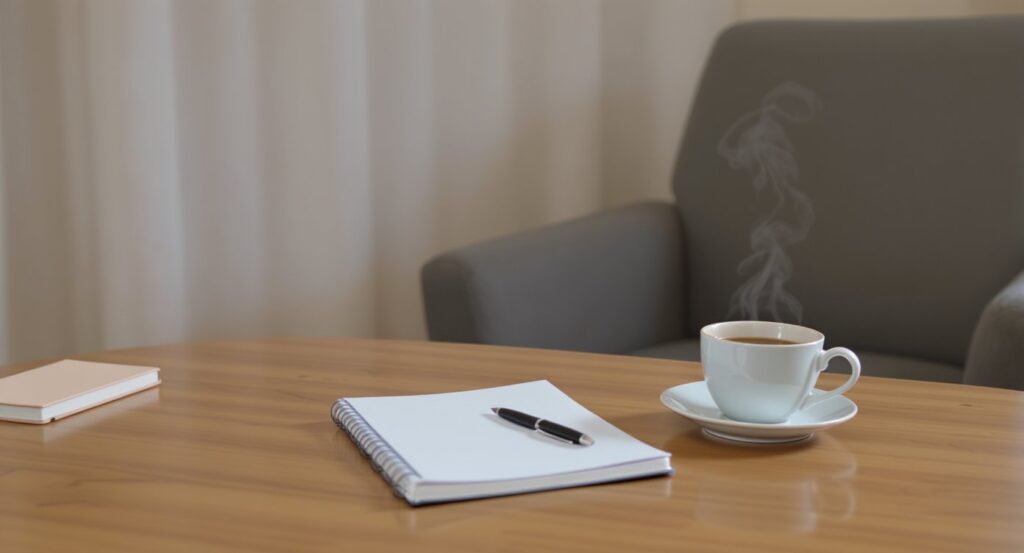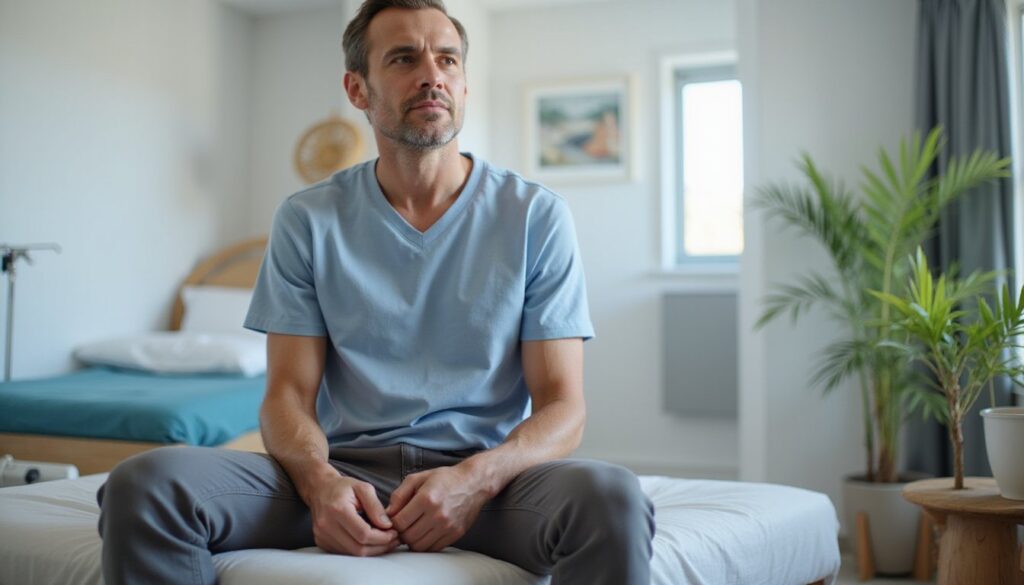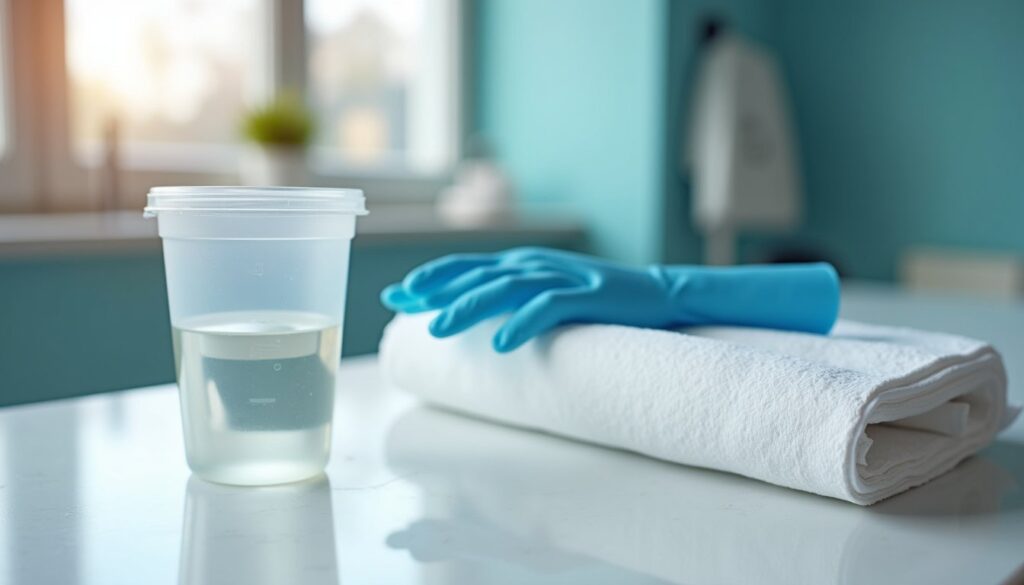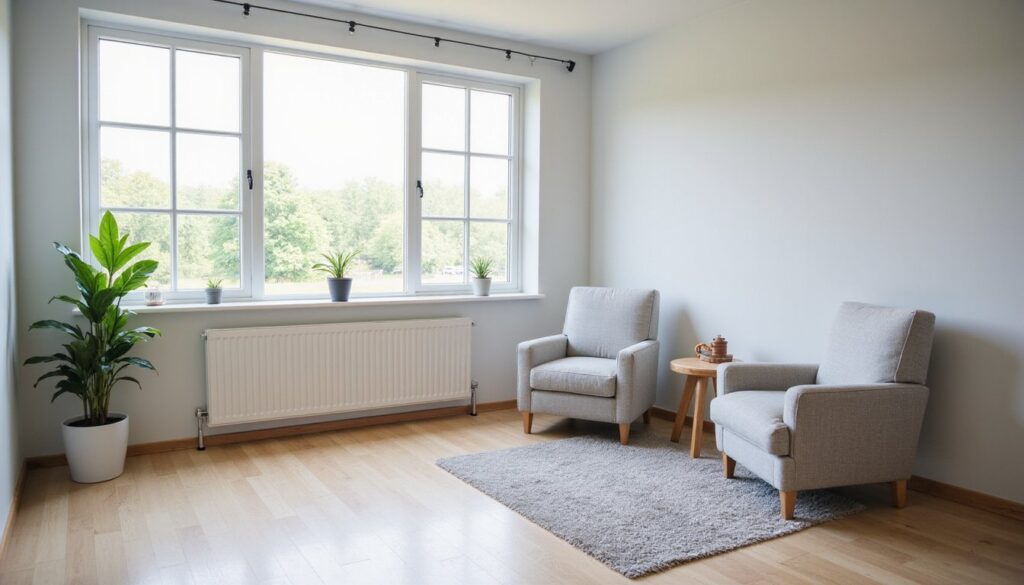During your first week in addiction treatment, you’ll undergo an initial medical assessment and begin settling into a structured daily routine. You can expect to participate in individual counseling, group therapy sessions, and educational workshops while following a schedule that typically runs from 7 AM to evening. You’ll connect with therapists and peers who understand your journey, receive personalized treatment planning, and have access to various support services. This overview just scratches the surface of what awaits as you begin your recovery journey.
Initial Medical Assessment and Detox Process
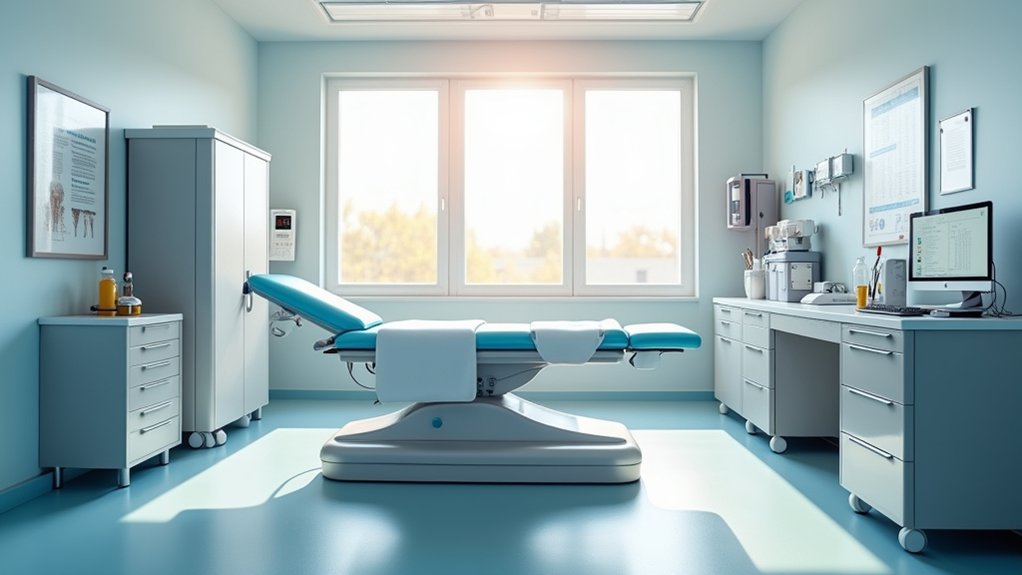
Four critical assessments await you during your first days in addiction treatment: medical evaluation, substance use history, health screening, and psychological profiling. Your initial evaluations will typically last 90 minutes, during which medical professionals will thoroughly review your health background and current condition.
You’ll undergo several medical tests, including drug screenings, infectious disease testing, and organ function assessments. The team will monitor your essential signs and evaluate any immediate health risks. A team of professionals including doctors, nurses, and therapists will work together to provide comprehensive care. Staff will evaluate any prescription medications you’re currently taking to ensure proper detox protocols. They’ll also examine your substance use patterns, previous treatment attempts, and family history to develop your personalized care plan. Throughout this process, you’ll meet with mental health professionals who’ll help identify triggers and assess any co-occurring disorders. This extensive evaluation guarantees you receive the most effective treatment tailored to your specific needs. The assessment process carefully considers your age and gender to ensure treatment recommendations are appropriate for your specific demographic.
Settling Into Your New Environment
You’ll quickly find that your days follow a structured routine, helping create a sense of stability during this important life shift. The support you receive from both staff and peers plays an essential role in making the environment feel more comfortable and familiar with each passing day. Through daily group activities, shared meals, and therapy sessions, you’ll start developing connections that make the treatment facility feel less like an institution and more like a healing community. Security systems help ensure a safe and protected environment for everyone in treatment. Your days will typically include meditation and psychoeducational classes, designed to promote personal development and healing in a supportive environment. After dinner, you can participate in 12-step programs that help build authentic sober relationships with others in recovery.
Adapting to Daily Routines
While entering a treatment facility marks a significant change in your life, the structured daily routines will help you establish a strong foundation for recovery. You’ll learn essential time management skills through a predictable schedule that balances therapy, self-care, and personal growth.
| Time | Activity |
|---|---|
| Morning | Meditation & Breakfast |
| Mid-Day | Group Therapy & Education |
| Afternoon | Skills Training & Exercise |
| Evening | Reflection & Rest |
Your days will include structured activities like morning meditation, group therapy sessions, and skill-building workshops. While routine flexibility exists to accommodate your individual needs, maintaining consistent patterns helps rebuild healthy habits. You’ll participate in both intensive therapeutic sessions and holistic activities, from art therapy to supervised exercise. This balanced approach guarantees you’re developing thorough recovery skills while having time for personal reflection and growth. Trained professionals are always available to provide guidance and support throughout your daily activities.
Building Comfort Through Support
Making the shift into a treatment facility becomes more manageable when you understand the thorough support system designed to help you settle in. You’ll find multiple layers of support networks that strengthen your emotional resilience during this adjustment period.
- Your primary therapist will work closely with you to develop personalized treatment goals and provide ongoing guidance through individual sessions
- Family therapy sessions help repair relationships and build stronger communication with loved ones
- You’ll connect with peers through group therapy and alternative activities like art or music therapy
- Support extends beyond facility walls through AA/NA meetings and alumni speakers who share their recovery journeys
The staff’s commitment to your well-being includes regular check-ins, clear communication channels, and access to mental health professionals whenever you need additional support during your adjustment period. A Certified Recovery Peer will meet with you individually to provide mentoring and help you navigate community resources for additional support.
Daily Schedule and Routine Expectations
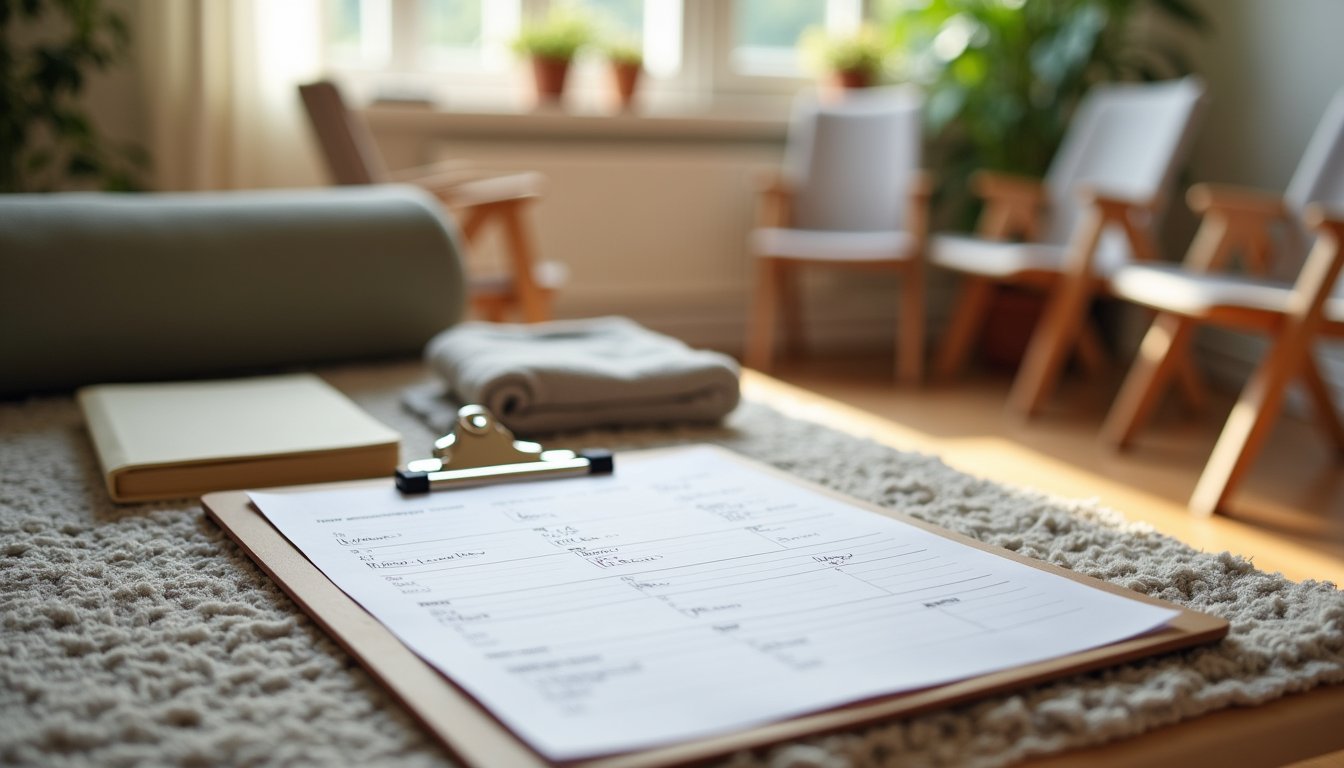
Your daily schedule at the treatment facility will follow a structured routine that starts with early morning activities like hygiene, medication, and breakfast. Throughout the day, you’ll participate in individual therapy sessions with licensed counselors who help you work through personal challenges. A key component of your treatment involves group therapy discussions where you’ll connect with peers facing similar recovery journeys. Many facilities offer holistic activities like yoga and gardening to promote overall wellness during your stay. You’ll spend your days engaged in therapeutic sessions, skills training, and wellness activities, with dedicated breaks for meals, reflection, and rest. Your evenings will wind down with group meetings, family contact time, and quiet personal activities before a consistent bedtime that guarantees you get adequate rest for the next day’s programming.
Morning to Evening Flow
From the moment you step into an addiction treatment facility, a structured daily schedule becomes your foundation for recovery. Your days will begin with morning mindfulness activities and flow through therapeutic sessions, concluding with evening reflection and rest. This carefully designed schedule helps you build healthy habits while providing stability during your recovery journey. Maintaining consistent wake-up times has been shown to reduce anxiety and create predictable routines that support long-term recovery success.
Here’s what your typical day will include:
- Start your day with early rising (6:30-7:30 AM), followed by meditation and wellness activities
- Engage in group and individual therapy sessions throughout the morning and afternoon
- Participate in physical activities and creative therapies to support your holistic healing
- Wind down with community meetings, personal reflection time, and structured evening routines before lights-out at 11:00 PM
This balanced approach guarantees you’ll receive thorough support while developing sustainable recovery practices.
Meal and Activity Times
While adjusting to life in treatment, you’ll follow a carefully structured daily schedule that prioritizes both physical and mental wellness through consistent meal times and therapeutic activities.
Your day begins with breakfast between 7:00-8:00 a.m., followed by morning meditation and group therapy. Lunch is served around noon, providing balanced nutrition while fitting seamlessly between your therapy sessions and physical activities. The program’s intensive behavioral health workshops and counseling sessions fill your afternoons. You’ll participate in nutrition education to understand the role of healthy eating in recovery. Dinner wraps up by 6:30 p.m., leaving time for evening programs and reflection.
Throughout the day, you’ll engage in structured exercise, complementary therapies like art or music sessions, and essential recovery work. This predictable meal timing helps stabilize your body and mind while creating a foundation for lasting wellness.
Building Therapeutic Relationships
Building strong therapeutic relationships stands at the core of successful addiction treatment. During your first week, you’ll engage with counselors who focus on rapport building and trust development through nonjudgmental, empathetic communication. Research shows that patients with higher initial motivation tend to form stronger bonds with their counselors. You’ll find that being open to these connections greatly improves your treatment outcomes and helps prevent relapse. Research shows that involving loved ones can lead to a 5.7% reduction in substance use frequency compared to individual therapy alone. Treatment plans are tailored using evidence-based interventions to meet your unique recovery needs and circumstances.
Strong therapeutic bonds and open communication with counselors create the foundation for lasting recovery from addiction.
Here’s what you can expect in building therapeutic relationships:
- Individual counseling sessions where you’ll set mutual goals and discuss treatment expectations
- Group therapy meetings that provide peer support and shared learning experiences
- Opportunities to involve family members or significant others in your treatment journey
- Regular check-ins with counselors who’ll help monitor your progress and adjust treatment strategies
Understanding Your Treatment Plan

A well-designed treatment plan serves as your roadmap to recovery, building upon the therapeutic relationships you’ve established. During your first week, you’ll work closely with clinicians to create an individualized approach that addresses your specific needs. This process begins with a thorough assessment of your physical health, mental well-being, and social circumstances.
Your treatment team will help you identify key challenges and develop clear, achievable treatment goals using the SMART criteria. They’ll incorporate evidence-based interventions like CBT, group therapy, or medication-assisted treatment based on your unique situation. You’ll also learn practical skills for managing cravings, stress, and triggers. As you progress, your plan will evolve, it’s a dynamic document that adapts to your changing needs and response to treatment.
Group Activities and Peer Support
During your first week of treatment, you’ll discover that group activities and peer support form the cornerstone of your recovery journey. The group dynamics you’ll experience include structured sessions with 12-18 fellow participants, where you’ll share experiences and learn from others who understand your challenges.
Group therapy provides a powerful foundation for recovery, letting you connect with others who truly understand your path to healing.
Here’s what you can expect from your group sessions:
- Daily check-ins where you’ll discuss your progress, cravings, and any concerns
- Educational activities focused on understanding addiction triggers and developing coping strategies
- Role-playing exercises that help you practice real-world recovery skills
- Opportunities to build lasting connections with peers who’ll support your sobriety
Through these peer interactions, you’ll develop a strong support network that greatly improves your chances of long-term recovery while rebuilding your confidence and self-worth.
Monitoring Progress and Adjustments
Throughout your first week, you’ll participate in thorough progress monitoring that helps your treatment team track your recovery journey. Your clinicians will assess key progress metrics including your mental health symptoms, substance use patterns, and treatment engagement. They’ll also monitor any cravings or challenges you’re experiencing.
Using digital assessment tools and structured interviews, your team will gather real-time data about your recovery progress. This information helps them make therapeutic adjustments to guarantee your treatment plan remains effective and personalized to your needs. You’ll receive regular feedback through visual progress reports, and your care team will meet frequently to discuss your treatment goals. If needed, they’ll modify your program components to better support your path to recovery.
Frequently Asked Questions
Can I Smoke Cigarettes During My Stay at the Treatment Facility?
Most facilities allow smoking in designated areas, but you’ll need to check specific smoking policies at your chosen location. You can usually bring factory-sealed cigarettes or have family mail them to you. If you’re looking to quit, many centers offer nicotine alternatives and cessation support. While policies vary by state and facility, you’ll typically have scheduled smoke breaks throughout the day. Just remember to follow the facility’s guidelines during your stay.
What Happens if I Need to Continue Working While in Treatment?
Many treatment centers understand your need to maintain employment and offer flexible options to accommodate your work schedule. You’ll find outpatient programs that let you attend therapy around your job hours, and some facilities even provide remote options for certain sessions. Don’t worry counselors will work with you to create a treatment plan that balances your recovery needs with work responsibilities. Many employers also support recovery through EAPs and protected medical leave.
How Do Facilities Handle Dietary Restrictions and Food Allergies?
Treatment facilities take your dietary preferences and restrictions seriously. During admission, you’ll complete a detailed assessment of your food allergies, religious requirements, and dietary needs. The facility’s dietitians will work closely with you to create personalized meal planning that guarantees both safety and proper nutrition. You won’t have to worry whether you’re vegan, gluten-free, or have specific allergies, they’ll accommodate your needs while supporting your recovery journey.
Are Personal Electronic Devices or Phones Allowed During Treatment?
During treatment, you’ll find that device usage is initially restricted – your phone and electronics will be held by staff upon arrival. This policy helps you focus entirely on your recovery without digital distractions. Most facilities have specific communication policies that gradually allow supervised access as you progress. Don’t worry you’ll still be able to maintain important connections, but in a way that supports your healing journey rather than compromising it.
What Clothing and Personal Care Items Should I Bring?
When planning your packing essentials, you’ll want to bring a week’s worth of comfortable, modest clothing that follows facility guidelines. Include casual daily wear, layering pieces, and appropriate sleepwear. Don’t forget practical footwear like closed-toe shoes and shower flip-flops. Pack weather-appropriate items and a few dressier options for special occasions. Remember to choose machine-washable clothes and avoid items with inappropriate graphics or revealing styles. Keep it simple and comfortable.


